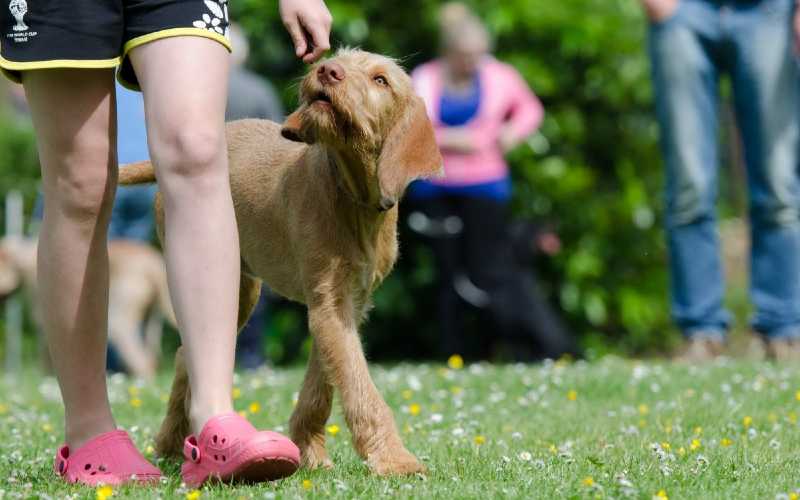patterdaleterriers.co.uk is a participant in the Amazon Services LLC Associates Program and other affiliate advertising programs designed to provide a means for us to earn fees by linking to Amazon.co.uk and affiliated sites. Affiliate links may be used on this page and in patterdaleterriers.co.uk articles, but they do not impact on the price that you pay and they do help me to get this information to you for free. Read my privacy policy for more information regarding affiliates.
Having a new puppy can be overwhelming especially if you are a first time dog owner. There’s so much that you need your little one to learn including how go to the loo outside, how to walk to heel and how to stop biting! Here are our top Puppy training Tips…
1. Going to the Loo
House training your puppy means that your pup will learn where to go to the loo – usually a garden or yard. This should be taught using the positive reinforcement method – catch them doing it in the right place and praise like crazy. Offer treats within 5 seconds of them doing their business so that they know exactly what it’s for.
2. No Jumping!
Even when it’s a puppy, don’t accept jumping up at people or guests. Use a simple command such as ‘Off!’ or ‘No!’ or ‘Ah-Ah!’ and use it consistently for things your pup should not be doing. It might seem like something that’s ok when he’s a puppy, but of course they don’t stay pups forever, and it won’t be acceptable when your dog is fully grown and so it has to be stopped now.
3. Crate training
Make sure that your puppy gets used to his crate and sees it as a comfortable and positive place (rather than a punishment). You can make it cosy in there with bedding and toys. This will make it easier to travel when he or she is older and it goes in a portable dog crate.
4. Stop Barking!
Train your dog to quit barking when told. This can be one of the tougher habits to break, especially if you get a dog who loves to bark. The most important thing to remember is to stay persistent with this one. If your dog is barking when it should not be, correct it every time with a consistent and simple command such as ‘Shush!’ . Do not give up on your persistence, and you will have success in the end.
5. Not being Protective of Toys or Food
Puppies should learn not to be protective of their food or toys because in later life this can turn into aggression if it persists. If he snaps and or growls when you go to take one of his toys tel him the ‘Ah-ah’ or ‘no!’ command. You can do positive reinforcement techniques to get him to allow you to take things for example, take a toy and give a treat, then return the toy. Also taking away his food bowl but giving it back with more food in it!
6. Get him used to New Places
Your puppy should now be scared of unfamiliar surroundings and that means socialising him and taking him out and about as soon as he is able to do so (usually after injections). Take him on buses and trains. Take him to dog friendly cafes and pubs! Take him to the vets and to the groomers. Anywhere he is allowed to go basically, you should try to take him!
7. No Chasing!
Absolutely no chasing or running after other animals, or other people should be allowed. A lot of puppies get into the habit of chasing after anything that will run from it and this is a particular problem with terriers. This goes for animals that it may see in the yard, or the mailman who visits your house everyday. After breaking this habit you will be glad that you did; just ask your mailman!
8. Get him used to being Left Alone
Puppies should get left alone from a young age for just very short periods of time such as 30 mins while you go to the shops. You can then build up the time to reach 3-4 hours alone as an adult dog. By getting your puppy used to alone time, he will firstly have less destructive behaviours and secondly have less separation anxiety which can be very stressful for the dog.
9. Going off Lead
Puppies are a lot easier to train with recall than adult dogs because their desire to stay with their owners is very high. Start doing off lead work with your dog as early as possible – firstly in your own garden and then a secure larger area. When you are confident you can try off lead work regularly when out and about. This is much harder with an adult dog.
10. Join a Puppy Class!
Socialisation and basic obedience are important for puppies. Socialise your puppy with other puppies and friendly socialised adult dogs. You can also do some basic obedience in a puppy class such as sit, stay, down and heel.
Overall, these Puppy Training Tips will surely make your relationship with your new puppy a positive experience. Puppies learn very quickly and a well trained pup will grow into an excellent dog.
You might also like to read about Positive Dog Training for Terriers and Do Puppies Lose Teeth?


1 thought on “Puppy Training Tips”